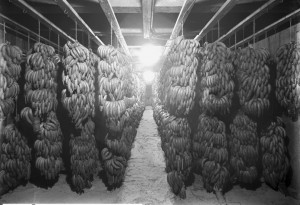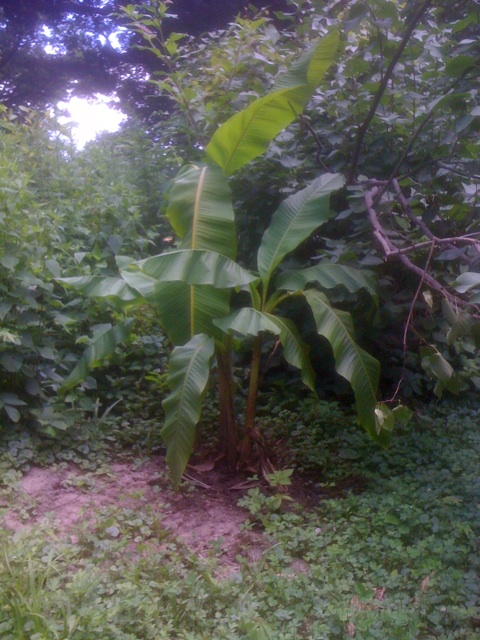
A banana storage room in Salt Lake City in 1913.
As early as 1905 the United States was importing 33 million bunches of bananas a year. Bunches averaged more than 100 individual bananas. Billions of bananas were being consumed in America before the Ford Model-T car was first produced.
Throughout the year (Bananas, like most tropical fruit, are always in season) bananas grown in the Caribbean and Central America traveled by boat to ports from New Orleans to New York City. There they were unloaded from the boats, often with the help of purpose built machinery, and placed on trains that carried them across the country and even north into Canada. In the space of the previous couple of decades, the banana had gone from a rare delicacy outside of the tropics, to a food available to and affordable by all.
A position it still occupies today as the cheapest fruit available in most grocery stores. (Last weekend they were $.79/lb here in Berkeley or $.99/lb for organic ones.) In 2005, the latest date for which I could find data, the average american ate just over 25 pounds of bananas making them the most consumed fruit (ahead of apples at ~17 pounds per year), and made up almost exactly a quarter of the total fresh fruit eaten by Americans.*
Bananas may be a cheap and healthy food, but they are never going to be a local food**. According to Bananas: An American History by Virginia Scott Jenkins there is exactly one commercially successful (using a broad definition of successful) banana growing operation in the entire continental US, found in a fluke niche of climate suitable for banana growing north of Los Angeles. If you don’t happen to live near Carpinteria, CA the only way to get them is by second day airmail at $45 for 5.5 pounds (more than eight dollars per pound) and that is assuming you can find the website to order them from, I had no luck in the short time I looked.
The favorite target of the local foods movement has been fresh fruits and vegetables airlifted from Chile to American grocery stores in the heart of winter, a practice that comes with a high price for both the environment and shoppers credit cards. Will they equally condemn the banana, a fruit whose travel from field to store is as efficient as more than a century of optimization can make it, truly is never out of season, represents the single largest contribution to American’s consumption of fresh fruit, and can be squeezed into almost any shopping budget?
Fair disclosure, I’m glossing over two issues with bananas. The pesticides used in their production, which definitely does need to be addressed, but I’m confident the way to address it is greater investments in alternatives (improved growing practices, less toxic pesticides, genetic engineering) not boycotts. Working conditions and compensation on banana farms: they suck. So do the conditions of pretty much all agricultural laborer jobs both in and outside the US. It is a real concern, but bananas aren’t at all alone in it. To address it, we would need to eat more grains and soybeans (crops where harvesting is mechanized), and focus on getting our nutrients from those few fruits and vegetables that are also harvested mechanically instead of by underpaid human beings. Cranberries spring to mind. And we’d also probably want to reduce meat consumption A LOT, conditions in meat packing plants are … not something I’m even going to get into in this post.
*Fun fact: bananas, apples, and oranges alone account for more than half of all fresh fruit eaten in America.
**You can’t grow edible bananas in the midwest, but its possible ornamental ones might survive. I’ll be interested to hear if it grows back after the winter.

Banana growing in central Iowa. Should find out next spring if this banana (a Musa basjoo) is hardy enough to overwinter.
** I read a story about a Midwesterner growing bananas to fruiting outside in Ohio. He supposedly dug them up each fall (they take two years to fruit) and let them go dormant at 50F in his garage over winter.
Comment by Matt — October 26, 2009 @ 3:38 pm
That’s dedication! I believe the Cornell plantations have a couple of tropical trees that get dug up and moved inside each winter. Always struck me as a wonderful extravagance.
Comment by James — October 26, 2009 @ 3:44 pm